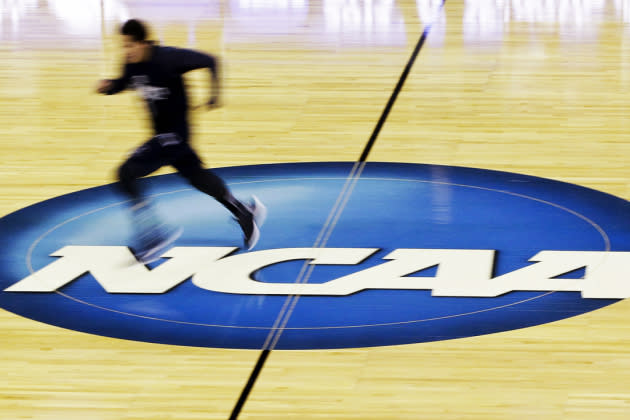NCAA Delays NIL Vote Under Pressure From Trump Justice Department

Multiple reports indicate the NCAA’s Division I Council on Monday postponed a historic decision to allow college athletes to profit from their name, image and likeness. The New York Times reported on Saturday that NCAA president Mark Emmert had recommended punting on a review that would have entailed analysis by both the DI Council and the DI Board of Directors. A favorable review had been expected to be completed by Jan. 14, with accompanying rule changes set to go into effect in the 2021-22 academic year. The postponement is indefinite, leaving the topic of NIL in murky waters.
A delay of weeks or even several months would not necessarily prevent rules from going into effect for the next school year. However, the longer the delay, the less transition time would be available for school compliance officers, athletic department leaders and university general counsel offices.
Emmert’s position reflects a warning by U.S. Assistant Attorney General Makan Delrahim, who leads the Justice Department’s antitrust division, that NCAA NIL rules must comply with federal antitrust law. The letter, first reported by USA Today, suggests the Justice Department could object to NIL rules as crafted by the NCAA.
The possibility of the NCAA postponing a decision is not new. Last July, Sportico revealed this possibility on account of the coronavirus pandemic’s disruption of college sports.
Whether the NCAA is punting on NIL due to a sternly worded letter authored by a Justice Department official who works for an administration that is a week-and-a-half away from leaving office invites some skepticism.
President-elect Joe Biden will take office on Jan. 20. With him will come a new Justice Department leadership team and a new set of priorities and viewpoints for enforcement of federal law.
Biden will nominate Merrick Garland, a judge on the U.S. Court of Appeals for the District of Columbia and a former federal prosecutor, to become U.S. Attorney General. It is not yet known who will head the antitrust division, but it will be a different person from Delrahim. The former Deputy White House counsel of President Trump will soon leave office along with other political appointees. Where NIL will rank in the new leadership’s list of priorities remains to be seen.
Another source of skepticism is that outgoing Justice Department officials’ letters do not constitute legal action. They are, in effect, warnings, in this case issued by someone who will soon lose authority. They are not prosecutions or lawsuits, nor are they necessarily precursors to them.
The Justice Department has taken this approach before. Ten years ago, the head of the antitrust division wrote a letter to the NCAA raising concerns about the BCS. It did not lead to litigation, though the BCS would be replaced three years later with a college football playoff system. One key difference: the Justice Department in 2011 was under the administration of President Barack Obama, who would continue to serve office until January 2017. This time around, the letter was sent under the administration of a president who will leave office no later than Jan. 20.
The antirust challenge for the NCAA—and, importantly, its schools and conferences—is straightforward in concept but difficult in application. Federal antitrust law bars competing businesses, including universities that vie for students, faculty and resources, from conspiring in ways that unduly harm competition. If colleges set a salary cap for coaches, it would be illegal price fixing under antirust (as shown in the Law v. NCAA decision). If colleges cap opportunities for athletes to profit from NIL, it might constitute illegal price fixing under antitrust law.
Whether a court would find the NCAA’s NIL rules unlawful is unknown and thus presents a risk for the NCAA. Expected NCAA NIL rules would generally allow college athletes to hire agents, sign endorsement deals and sponsor camps but would come with so-called “guardrails” that restrict college athlete autonomy and ensure their schools maintain some degree of control. Therein lies the potential antitrust problem: if the NCAA and member schools agree to restrain the market through guardrails, their “conspiracy” could then be challenged under antitrust law. A challenge, of course, might fail. A court could find the restrictions are sensible and equitable given the educational goals of American colleges. But the NCAA would rather not have a court review those rules, most likely over a period of years.
A legal challenge is neither an abstract concern nor mere fodder for legal scholars. The NCAA’s rules are expected to be more restrictive than NIL statutes adopted in California, Florida and other states. Discrepancies between state laws and NIL rules could trigger a bevy of lawsuits.
The NCAA, for instance, could argue that a state’s NIL law interferes with interstate commerce. College athletes in states with NIL statutes, meanwhile, could challenge the NCAA under antitrust grounds. To further complicate the landscape, several members of Congress have introduced legislation that would create a federal NIL right for college athletes; such a right might conflict with either or both the NCAA’s NIL rules and states laws. Then there is the possibility that the U.S. Supreme Court’s forthcoming ruling in NCAA v. Alston leads to further disruption.
More from Sportico.com